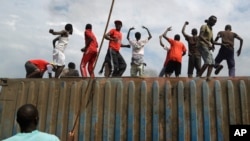Organizers of the Burundi protests have indicated they will return to the streets Monday for more demonstrations after an opposition leader and his bodyguard were killed.
The opposition has also announced it has quit peace talks with the government.
Innocent Muhozi, general manager of the independent Renaissance Radio station, said the protesters are returning to the streets because they say nothing has changed.
“The organizers are calling for a bigger protest Monday because one of the opposition [leaders[ was killed yesterday, and they also suspended the negotiations they started with the government. So, they say they are going to be protesting again because nothing has changed till now,” he said.
Muhozi said the protesters believe it’s their constitutional right to demonstrate and they have generally been peaceful. They only turned violent once the police began shooting at them.
“The protesters said, first, you cannot prohibit people from exercising their right to protest when they want to protest. You cannot lock off all independent media in the country and talk about free and fair elections. You cannot talk about free and fair elections when [the] opposition cannot go [about] in the country because [of] security problems,” Muhozi said.
The protesters oppose President Pierre Nkurunziza’s decision to run for a third term, which they argue violates the constitution and the Arusha Agreement. Nkurunziza said he is qualified to seek another term because his first election came by a vote of parliament, not the voters.
Muhozi said if Nkurunziza does not delay the presidential election, set for June 26, the country could be in bigger trouble than what it is experiencing now.
“If the whole region is telling you, ‘Please don’t do that;’ the African Union is telling you, ‘Don’t do that;’ the European Union is telling you, ‘Don’t do that;’ the United States is telling you, ‘Don’t do that;’ the whole world is telling you, ‘Don’t do that.’ If you don’t care about what these people are saying, we are going to be in a big, big trouble in this country,” he said.
He said eyewitnesses blamed the killing of opposition leader Zedi Feruzi, leader of the opposition Union for Peace and Development, on people believed to be wearing the presidential guard uniform.
“This opposition [leader] who was killed was around his home with two of his guards and journalists of his neighborhood. They were talking when a car came by and [gunmen inside] started shooting at them. The journalist escaped but he was also wounded. But, he said he saw clearly people in uniform of the presidential security services were the ones who shot at them,” Muhozi said.
Nkurunziza has denied any responsibility for the killing of Feruzi. Presidential spokesman Willy Nyamitwe said Nkurunziza has called for a “quick” investigation into the assassination.
Muhozi said the president’s call for an investigation will not ease tensions because “there is a lot of killing done by policemen or security services. So, no one is seeing this statement as something serious. It’s always the same kind of statement and after that it’s nothing that is done.”
Nkurunziza’s government has blamed the protests on what it calls a small number of agitators based in the capital city, Bujumbura. But, Muhozi said, the president should not underestimate the protesters.
“First of all, if your capital city is protesting against you, how can you say it’s a small thing when you know that more than 50 percent of your GDP is coming from this place? How can you say it’s a small thing? How can you say that the countryside people support you when you are the only [one] to be there? You don’t allow your opposition to be there and meet the people,” Muhozi said.
Some Burundian journalists and civil society people contacted by VOA have chosen to remain anonymous because of the tense security situation there. But, Muhozi said he’s speaking because Burundians deserve to live peacefully in their own country.
“We are all human beings; we need peace; we need our rights to be respected. This will not come from the sky. We have to fight for it. I’m staying here to try to do my best so that, one day, we can all live in peace,” Muhozi said.





